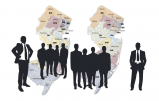Almost everything we know about our population and our communities comes from information collected during the decennial census and its related surveys. When New Jersey residents are not counted, the state loses funding and influence. Read the full policy paper.
Issues in Depth
It is widely documented that New Jersey has one of the best public education systems in the country. However, disparities persist and are correlated with segregation, both economic and racial. New Jersey has one of the most segregated public school systems in the nation. In fact, only two states have more segregated schools than the Garden State. Read the full policy paper.
New Jersey is among the most segregated states in the nation in terms of housing. This dynamic creates communities where poverty is concentrated, educational and economic opportunities are scarce, and upward mobility is limited. Read the full policy paper.
Legislative Redistricting by the New Jersey Plan 1993
In 1993 The Fund for New Jersey released the report, Legislative Redistricting by the New Jersey Plan. The report was a second analysis by professor Donald Stokes who served on the 1991 redistricting committee in NJ. In this report, he makes observations in three areas to help assess the past and provide insight into the future of the redistricting process. Read the full policy report here.

Legislative Reapportionment in New Jersey 1991
In 1991 The Fund for New Jersey Published the report, Legislative Reapportionment in New Jersey. The report by Donald E. Stokes, former Dean of the Princeton University School of Public and International Affairs, aimed to provide New Jersey citizens with a historical perspective and framework for measuring the fairness of competing proposals as they emerged for consideration during the 1991 redistricting process. Read the full policy report here.
Human activity such as burning fossil fuels increases carbon dioxide and other greenhouse gas concentrations in the atmosphere, thereby “forcing” climate change. The natural consequences of climate change include superstorms such as Hurricane Sandy, rising sea levels, and extreme fluctuations in heat and precipitation. Read the full policy paper.
There are many reasons to cheer New Jersey's democratic well-being and there are also reasons to worry. There are many opportunities for action in increasing representation in redistricting, the safety and access of voting and voting systems in the state, and other areas of democratic importance. Read the full policy paper here.
New Jersey benefits from the presence of large and vibrant immigrant communities that make significant cultural and economic contributions to the state. More than 2 million immigrants live in New Jersey (22% of the population). Read the full policy paper.







